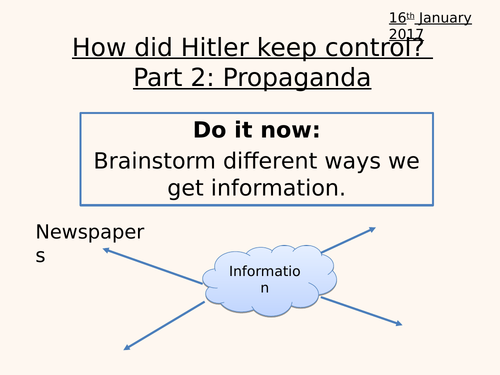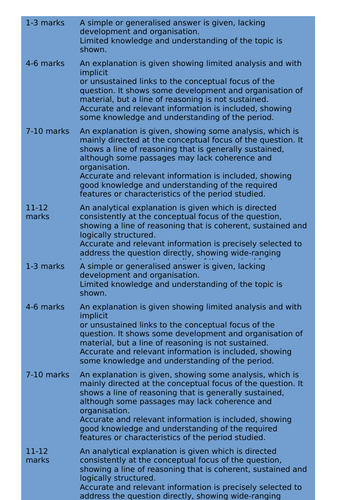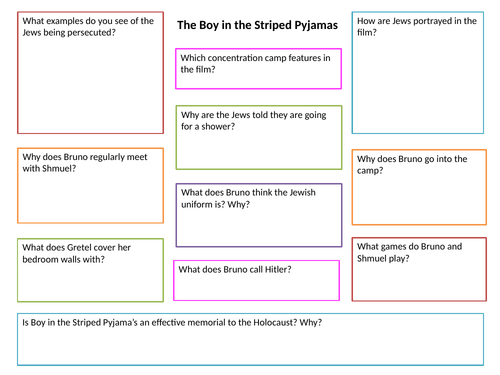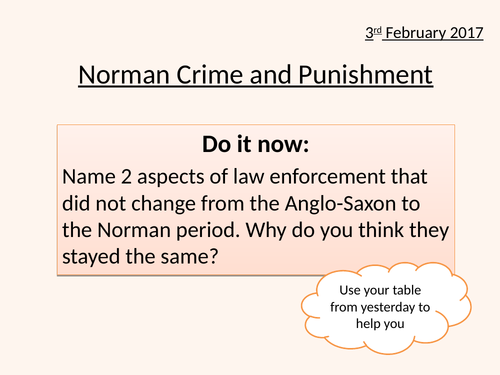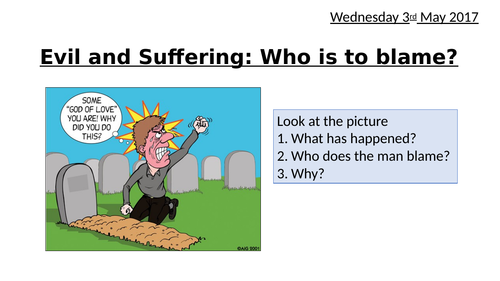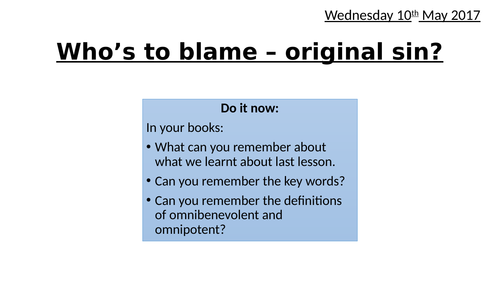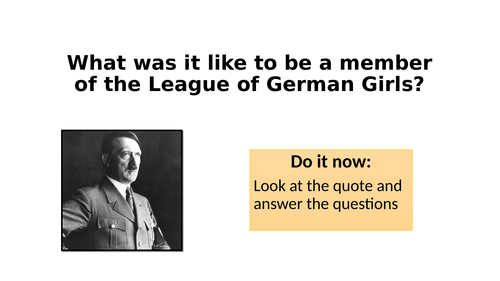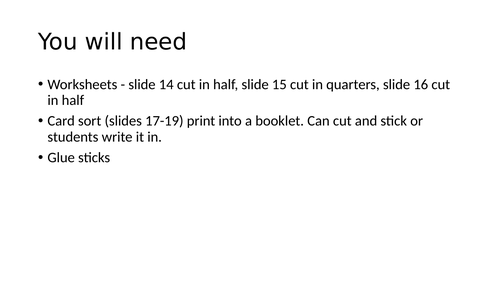338Uploads
121k+Views
42k+Downloads
Featured resources

Nazi Propaganda
Whole lesson plus differentiated resources for a lesson on Nazi Propaganda, suitable for 14-16s. Looks at the role of Goebells, and includes a worksheet on annotating Nazi propaganda posters.

GCSE Crime & Punishment - Anglo Saxons Lesson 1
Lesson 1 for Crime and Punishment GCSE Edexcel lesson on Anglo-Saxons.
The lesson introduces Anglo-Saxon society, and looks what types of punishments the Anglo-Saxons used. In the end students decide whether the punishments were fair.
Includes whole lesson plus video clip and resources. Includes a search and find activity (all resources included). Includes a 12 mark practice question.

GCSE Crime and Punishment - Anglo Saxons Lesson 2
Lesson 2 for Crime and Punishment - Anglo-Saxons (Edexcel).
Whole lesson plus resources. This lesson looks at the attitudes behind Anglo-Saxon punishments. Includes a 12 mark question plus mark scheme for student’s to self assess.

GCSE Crime and Punishment - Normans Lesson 2
Second lesson plus resources for the GCSE Crime and Punishment module (Edexcel 9-1). This lesson looks at changes and continuity in crime and punishment from Saxon to Norman England. The lesson will require the Crime and Punishment textbook by Edexecel.

Boy in Striped Pyjama's
Worksheet that can be completed whilst watching the film Boy in Striped Pyjama’s.

GCSE Crime and Punishment - Normans Lesson 1
Lesson 1 for GCSE Crime and Punishment - Normans (Edexcel)
This lesson covers the changes the Normans introduced.
Includes video clips, resources and a 12 mark exam question.

GCSE Crime and Punishment - Saxon/Norman
Whole lesson plus resources for GCSE Crime and Punishment (Edexcel 9-1). This lesson looks at the changes and continuity in crime and punishment from Saxon to Norman England. Features a card sort activity where students find changes/continuity in Anglo Saxon and Norman crime and punishment.
Bundle

GCSE Crime & Punishment Saxons/Normans BUNDLE
Save 35%!
Bundle of 5 lessons for the Edexcel GCSE 9-1 Crime and Punishment Saxons/Normans unit.
Complete set of 5 lessons plus resources, differentiated, and exam style questions.

20th Century Introduction
Whole lesson plus resources looking at an overview of the 20th century. Good as an introductory lesson to the 20th century. Involves creating a timeline (differentiated).

Medieval towns for EAL students
A resource worksheet exploring Medieval towns for use with EAL students. EAL strategies are implemented throughout.
Suitable for any topic on Medieval towns.

Who is to blame for evil and suffering?
Full lesson plus activities and for teaching who is to blame for evil and suffering. Suitable for 11-16 Philosophy and Ethics or Religious Studies.

Pandora's Box
Whole lesson plus differentiated activities and links to videos. For teaching 11-16 Philosophy or Religious Education.
Bundle

Evil and Suffering Scheme of Work
SAVE 25%!!!
Whole Scheme of Work for teaching the unit Evil and Suffering for Religious Studies/Philosophy and Ethics.
All 5 lessons include differentiated resources, activities, and everything you need to teach it straight away.
Starts off with looking into the idea of evil and suffering with Pandora’s box, the following lessons explore the idea of who is to blame - the Devil, us, and do we need suffering?
Pandora’s Box
Who is to blame
Original Sin
The Devil
Do we need suffering?
Please review if you purchase.

Evil and suffering - original sin
Who is to blame for evil and suffering? This lesson explores original sin. Whole lesson plus resources and differentiated activities included.

League of German Maidens
Whole lesson on the League of German Maidens, complete with all of the accompanying worksheets and differentiated tasks.
Please review if you purchase.

Who was Otzi the Iceman?
Otzi the Iceman history lesson - created for STEM week so has science/technology/archaeology themes.
Students decide who Otzi the Iceman using investigation - what is the story? What items was he discovered with? Includes some videos links, differentiated resources and all worksheets.
Perfect for KS2 and KS3!

Trial of Charles I
**Suitable for teaching KS3 Charles I and the English Civil War.
**
Whole lesson plus differentiated resources on the trial of Charles I. This lesson explores whether Charles was guilty or not against his four charges. The lesson includes source analysis and a differentiated card sort of guilty/not guilty facts. Also includes a video clip with questions to match on the trial.
Please review if you purchase and check out my other Charles I and the English Civil War resources.

Norman Conquest: Motte and Bailey Castles
Suitable for teaching 11-14s Norman Conquest (can be adapted for primary).
Whole lesson plus all differentiated resources needed on motte and bailey castles! Students will be answering the enquiry question:
Why did William the Conqueror build so many castles?
Students use Warwick Castle as a case study (fantastic if you go there on a trip), label a motte and bailey castle, look at how to attack and defend, and finally understand why William built so many castles around the country.
A really fun and interactive lesson which students love.
Please review if you purchase, and check out my other Norman Conquest resources.

GCSE Germany | Women in Nazi Germany
For teaching Edexcel GCSE 9-1 Weimar Republic and Nazi Germany 1918-1939
Life in Nazi Germany
How effective were Nazi policies towards women?
This lesson looks at Nazi policies towards women.This includes:
Propaganda poster source analysis starter task
Women in the Weimar Republic
Nazi views on women (Kinde, Küche, Kirche)
Women, marriage and family
Women and employment
This lesson also includes the sources and interpretations from the 2019 exam (which was based on women). I was an examiner for this exam so this lesson includes an exam feedback PowerPoint created from my experience exam marking! This can be used as a teaching guide or used with students.
Also included:
Accompanying work booklet to the lesson, with a wide range of fun activities!
20 question quiz plus answers based on the lesson
Part B for Paper 3 exam questions with sources and interpretations - 3a, 3b, 3c and 3d
3d exam question ‘how far you agree with interpretation…’ with AfL sheet
Please review if you purchase, and check out my other Weimar and Nazi Germany resources.

OCR Tudor Rebellions | Causes of Rebellion
For teaching OCR A Level Rebellion and Disorder in Tudor England 1485-1603
Why was the Tudor Period so rebellious?
This lesson gives an overview on why the Tudor period was so rebellious and the different causes of rebellion. This includes:
Frayer Model starter task (with answers)
In dept discussions on the causes of rebellion
Why age and gender made rebellion more likely (Edward VI, Mary I, Elizabeth I) using contemporary sources
Analysing turning points in the cause of rebellion
This is an excellent introductory lesson for students studying this course, and prepares them for further analysis of cause of rebellions.
Also included:
Accompanying work booklet to the lesson, with a wide range of fun activities!
Fully resourced 2 hour lesson
Detailed teacher guidance notes
Thanks for looking at this resource, and please check out my other Tudor Rebellion lessons and resources.
Please review if you purchase!




